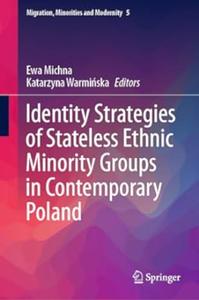|
View: 841|Reply: 0
|
[Books & Magazine]
Identity Strategies of Stateless Ethnic Minority Groups in Contemporary Poland (2024)
[Copy link]
|
|
|

Free Download Ewa Michna, Katarzyna Warmińska, "Identity Strategies of Stateless Ethnic Minority Groups in Contemporary Poland"
English | 2020 | pages: 189 | ISBN: 3030415740, 3030415775 | PDF | 2,0 mb
This book provides a unique description of the identity strategies of stateless ethnic minorities in Poland. It describes and analyses the identity politics carried out by these groups, aimed at obtaining recognition of a separate status from the Polish state (a dominant group) in the symbolic and legal realms. On the one hand, comparative analysis of the activity undertaken by Lemkos, Polish Tatars, Roma, Kashubians, Karaims and Silesians will allow us to present the specifics of each of the communities, resulting from the special nature of their ethnicity. On the other hand, it will show some typical strategies for stateless groups in the field of identity and ethnicity. Critical factors here are processes such as building ethnic borders, dealing with a non-privileged position, striving to achieve recognition for the status quo of a particular identity or politicization of ethnicity. The subjects are mostly indigenous groups, and the lack of legitimacy of emancipation in their own nation-state can determine their status as an 'in-between' in the context of ethnic relations in Poland. In the analysis undertaken in the book of the activity of the ethnic groups there are three main contexts: intragroup, state policy and the global discourse of the rights of minorities. They determine the choice of identity strategy and adopted policy of identity. Not without significance is also the historical context, especially the political transformation in Poland after 1989, when Polish state policy towards ethnic minorities changed fundamentally - moving from the mono-national ideology of a socialist state to a pluralistic model of a democratic state. Gathering diverse examples in one volume will allow the reader to become familiar with the complex topic of ethnic relations in the world today, and especially in Central Europe, which is still in the process of change.
Links are Interchangeable - Single Extraction |
|
|
|
|
|
|
|
|
|
| |
Category: Shop Online/Classified
|